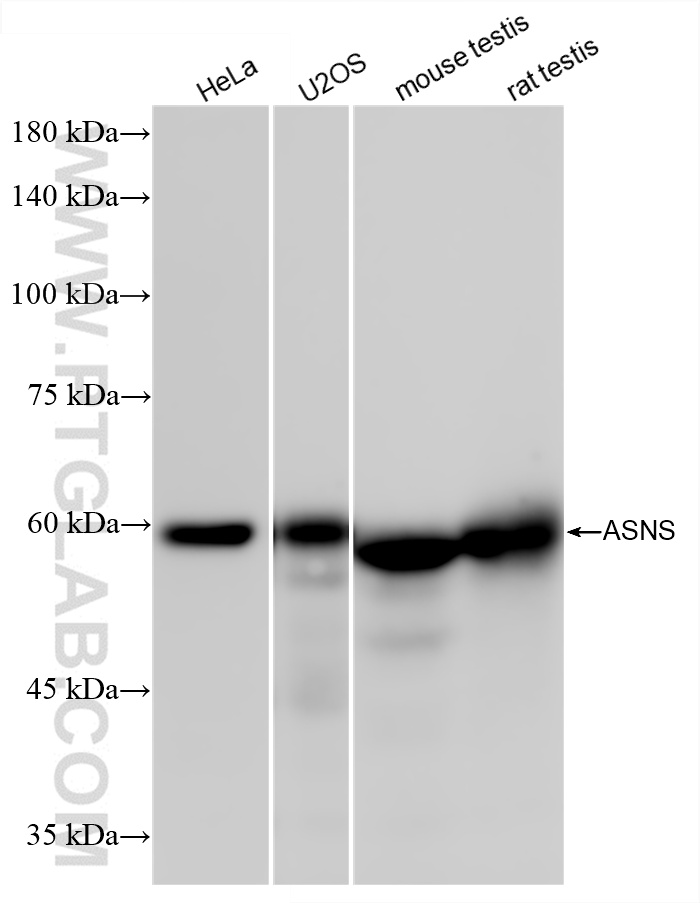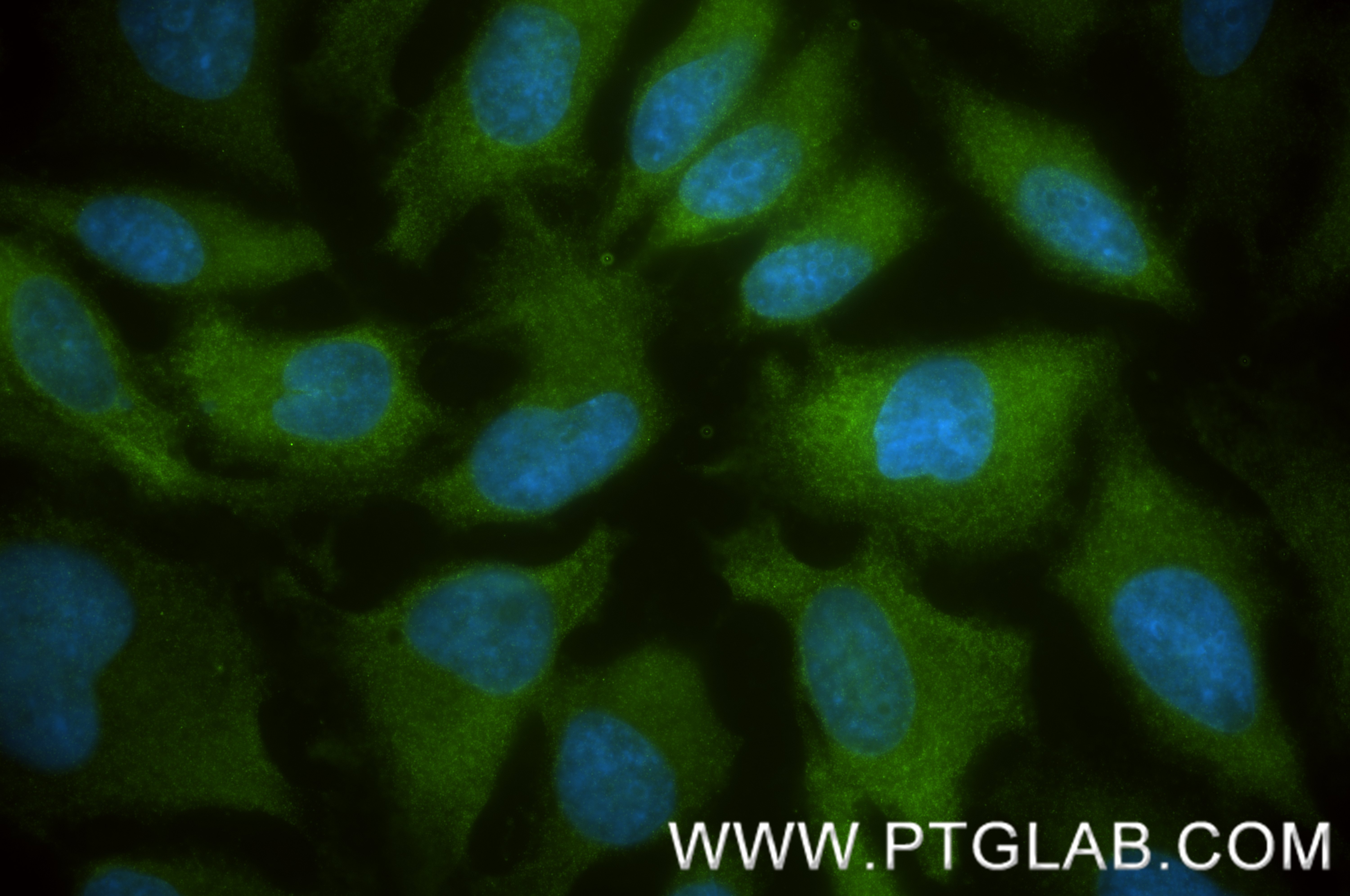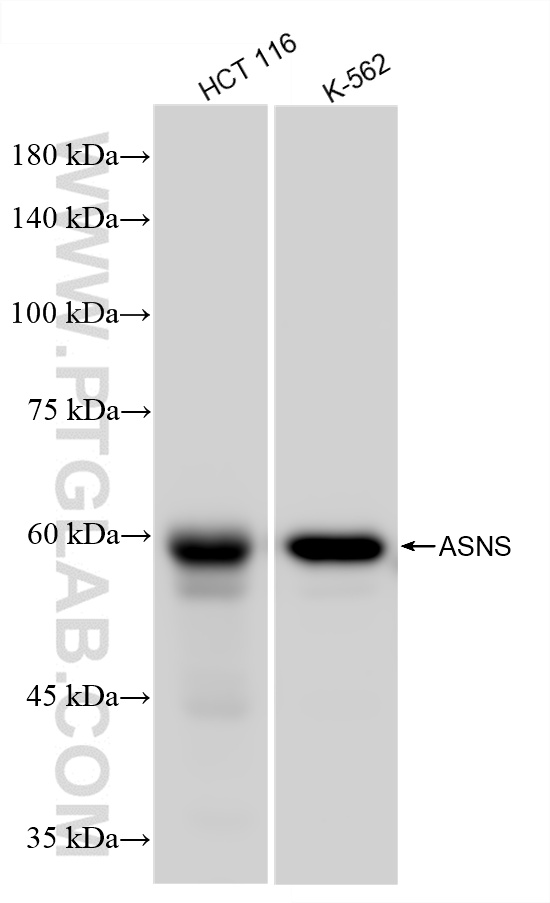验证数据展示
经过测试的应用
| Positive WB detected in | HeLa cells, HCT 116 cells, K-562 cells, U2OS cells, mouse testis tissue, rat testis tissue |
| Positive IF/ICC detected in | HeLa cells |
推荐稀释比
| 应用 | 推荐稀释比 |
|---|---|
| Western Blot (WB) | WB : 1:1000-1:10000 |
| Immunofluorescence (IF)/ICC | IF/ICC : 1:200-1:800 |
| It is recommended that this reagent should be titrated in each testing system to obtain optimal results. | |
| Sample-dependent, Check data in validation data gallery. | |
产品信息
85892-1-RR targets ASNS in WB, IF/ICC, ELISA applications and shows reactivity with human, mouse, rat samples.
| 经测试应用 | WB, IF/ICC, ELISA Application Description |
| 经测试反应性 | human, mouse, rat |
| 免疫原 |
CatNo: Ag6393 Product name: Recombinant human ASNS protein Source: e coli.-derived, PGEX-4T Tag: GST Domain: 247-561 aa of BC014621 Sequence: LMTDRRIGCLLSGGLDSSLVAATLLKQLKEAQVQYPLQTFAIGMEDSPDLLAARKVADHIGSEHYEVLFNSEEGIQALDEVIFSLETYDITTVRASVGMYLISKYIRKNTDSVVIFSGEGSDELTQGYIYFHKAPSPEKAEEESERLLRELYLFDVLRADRTTAAHGLELRVPFLDHRFSSYYLSLPPEMRIPKNGIEKHLLRETFEDSNLIPKEILWRPKEAFSDGITSVKNSWFKILQEYVEHQVDDAMMANAAQKFPFNTPKTKEGYYYRQVFERHYPGRADWLSHYWMPKWINATDPSARTLTHYKSAVKA 种属同源性预测 |
| 宿主/亚型 | Rabbit / IgG |
| 抗体类别 | Recombinant |
| 产品类型 | Antibody |
| 全称 | asparagine synthetase |
| 别名 | Asparagine synthetase [glutamine-hydrolyzing], EC:6.3.5.4, Glutamine-dependent asparagine synthetase, TS11 |
| 计算分子量 | 64 kDa |
| 观测分子量 | 55-64 kDa |
| GenBank蛋白编号 | BC014621 |
| 基因名称 | ASNS |
| Gene ID (NCBI) | 440 |
| 偶联类型 | Unconjugated |
| 形式 | Liquid |
| 纯化方式 | Protein A purification |
| UNIPROT ID | P08243 |
| 储存缓冲液 | PBS with 0.02% sodium azide and 50% glycerol, pH 7.3. |
| 储存条件 | Store at -20°C. Stable for one year after shipment. Aliquoting is unnecessary for -20oC storage. |
背景介绍
Asparagine synthetase [glutamine-hydrolyzing](ASNS) is also named as TS11. The asparagine synthetase gene, encoding the enzyme that catalyzes the synthesis of asparagine and glutamate using glutamine and aspartate, is a gene for which transcription is highly regulated by the nutritional status of the cell(PMID:15385533). ASNS has some isoforms with the MW of 55-64 kDa.
实验方案
| Product Specific Protocols | |
|---|---|
| IF protocol for ASNS antibody 85892-1-RR | Download protocol |
| WB protocol for ASNS antibody 85892-1-RR | Download protocol |
| Standard Protocols | |
|---|---|
| Click here to view our Standard Protocols |





